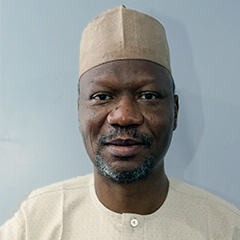
By Walter Duru, Ph.D
One of the issues that came up strongly during last week’s peer review meeting of judicial officers in Abuja is the need for special courts for corruption cases in Nigeria.
The setting was a National Peer Learning Review Roundtable for State Judges on the Implementation of the Administration of Criminal Justice Act, organised by the Rule of Law and Anti-Corruption- ROLAC programme of the British Council (funded by the European Union), held at Treasure Suites hotel, Abuja.
Setting the stage for the discourse, Lagos State representative, on behalf of the Chief Judge of Lagos State, Hon. Justice Kazeem Olanrewaju Alogba argued that special courts for general criminal cases, financial crimes and sexual offences will speed up justice delivery in the country.
According to him, “one key challenge faced is a few retirements and having fewer hands-on decks.”
“Some of the amendments proposed in the ACJL 2021 and innovations are around video conferencing for vulnerable witnesses, communications, remand, monthly visits and to ensure that bail arraignment are dealt with; prevention of media parade of suspects, compensation to victims of bad judgement, collaboration with Ministry of Justice and Attorney General in the establishment of crime data register, among others.”
“Other areas include regular prison decongestion exercises, use of technology, data collection and analysis and the reviewed criminal laws in Lagos state with innovative provisions.”
Justifying ROLAC’s intervention, Anti-corruption Programme Manager of the Rule of Law and Anti-Corruption programme -ROLAC, Emmanuel Uche said judicial officers across the country were assembled in Lagos and Abuja to enable them share experiences and knowledge on the implementation of the Administration of Criminal Justice Act -ACJA with particular focus on anti-corruption cases across the country.
Speaking earlier on the essence of the meeting, Secretary of the Administration of Criminal Justice Monitoring Committee (ACJMC), Sulayman Dawodu said it was aimed at sharing knowledge and experiences on ACJA implementation in Nigeria.
“The administration of the criminal justice monitoring committee is the custodian of the ACJA with the unique responsibility of ensuring speedy trial and effective dispensation of criminal justice in Nigeria. The law has ensured that the justice system is blessed with some remarkable innovations which include: clear oversight functions, timeliness, proper reporting and monitoring mechanism to ensure that the purpose of the ACJL under section 1 is achieved by all stakeholders. It is remarkable to note that there are criminal divisions established in Edo and Lagos states, in line with the law, which is why we have counterparts from these states and other states, the EFCC and ICPC, to share and discuss lessons in their efforts to implement the law, in this roundtable. The roundtable will be tilted towards the anti-corruption component of RoLAC, so discussions will revolve around criminal justice as it relates to Anti-corruption which cuts across all offences.”
He emphasized that discussions would dwell more in the areas of speedy trials, case handling/management and plea bargain, which, according to him, are also part of the responsibilities of the ACJ Management Committee.
Continuing, he explained that “the consideration of anti-corruption is also deliberate, owing to support from Component 3 of RoLAC, which is sponsoring this roundtable in conjunction with Component 1 which is primarily focused on implementing the criminal justice reform agenda.”
“This meeting is also a follow up to the meeting held in Lagos on the 4th of November 2021, which had judges from Lagos, Ogun and FCT, but there are more Judges present here today. We have judges from the FCT, Adamawa, Kano, Anambra and Edo states, and we hope that the experience will be more robust.”
“So, my Lords will be called upon to share their success stories in the application of the law in practice in their various jurisdictions and we will confront the challenges collectively. We will be focusing on, and considering issues around plea bargain, how it has fared, how it has been applied in practice, how the committees are functioning and practically discuss the challenges encountered with the view to proffering lasting solutions.”
“Based on the data gathered by the ACJMC, some courts are struggling for major compliance with these provisions and it is also common knowledge that despite these provisions, we still have congestion in our court dockets, largely based on non-application of speedy trial mechanism as a result of collective lapses. So, in an attempt to improve the current position, the ACJMC has facilitated several workshops at different levels to address the issues and find practical solutions.”
According to him, “some of the ideas envisaged include advocating for the establishment of Criminal Divisions in state judiciary(under which a special section for financial crimes is designated), ensuring advocacy for national non-custodian committee which is responsible for setting up other state criminal justice divisions, application of case management hearing in complex anti-corruption cases and de-clogging of court docket from the office of the Department of Public Prosecution – DPP and setting up of criminal justice trust fund, among others.”
Also speaking, RoLAC’s Component 1 Manager, Dr. Oluwatoyin Badejogbin commended the judicial officers for attending the event, their heavy workload notwithstanding.
He said: “Most of you are coming from jurisdictions with heavy workload, working day-in, day- out, from morning till night, writing rulings and evaluating evidence. This kind of peer learning roundtable should be held more often, perhaps half yearly for a start. It should be structured in a way that judges can relax and share experiences and learn from each other on the adjudication of cases.”
“Judicial peer to peer approach is inherently relational, and as such, requires the investment of time and resources to maintain and build reciprocal relationships through offering channels of help and foundation to share best practice and a better understanding of institutional, cultural, and political dynamics on the function of judicial officers. It also helps to build mutual trust and respect for practitioners, providing a window for judges to improve their own judge craft and work more strategically to improve the rule of law. It is through engaging in these discussions that judicial peer to peer approaches can help to develop creative solutions in development challenges across our world.”
In their respective goodwill messages, Chief Judges of Edo, Adamawa, Anambra, Kano and Federal Capital Territory poured encomiums on ROLAC for its huge investments in deepening the knowledge of judicial officers and other critical stakeholders, while strengthening the implementation of the Administration of Criminal Justice Act in Nigeria.
The technical sessions of the meeting centered around Plea bargain in anti-corruption, Case Management hearing in anti-corruption, Remand proceeding/Speedy trial provision in ACJL in anti-corruption cases/Mechanism, Criminal court division in practice, Special Court for anti-corruption and Constitutional review and criminal justice reform.
In all of these, the need for vigorous implementation of the Administration of Criminal Justice Act cannot be over emphasized.
States that are yet to adopt the Act are strongly encouraged to initiate steps towards having state versions of the Law, in the interest of speedy adjudication of justice, among other benefits.
Steps need to be taken urgently to establish special courts for the handling of corruption and other specialized cases, as this will lead to professionalism and speedy dispensation of justice.
Furthermore, other donor agencies in the country must borrow a leaf from ROLAC to ensure the strengthening of the country’s judicial systems to enable them function optimally.
Final, the efforts of the European Union-funded ROLAC (managed by the British Council) cannot go without commendation. ROLAC’s intervention in supporting the vigorous implementation of the Freedom of Information Act in Nigeria remains unrivaled.
Its investment in strengthening ACJA implementation in Nigeria also deserves commendation and therefore worthy of emulation.
But, if stakeholders want special courts to try corruption cases in Nigeria, with all the justifications – why not?
All hands must be on deck!



